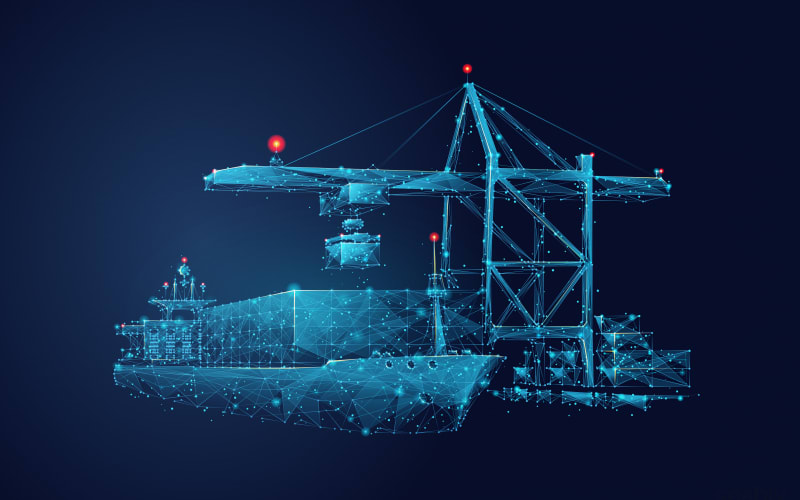Securing The Seas: The Imperative Of Maritime Cyber security

12 September 2023
Overview: Maritime Cyber Security
In an era defined by digital transformation and technological advancement, virtually no industry remains untouched by the ever-evolving threat of cyberattacks. Among the sectors that have increasingly come under the scrutiny of malicious actors is the maritime industry, which plays a pivotal role in global trade and commerce. As vessels and ports become more interconnected through sophisticated systems and the Internet of Things (IoT), the importance of tackling maritime cyber threats cannot be overstated.
The Global Maritime Industry: A Backbone of Global Trade
Before delving into the significance of addressing cyber threats in the maritime sector, it is essential to understand the industry’s colossal global impact. Maritime transport carries over 80% of the world’s trade by volume and constitutes the lifeblood of international commerce. Enormous container ships, oil tankers, and bulk carriers traverse the world’s oceans, ensuring the movement of goods and raw materials vital to economies across the globe.
Moreover, ports are critical nodes in the supply chain, serving as hubs for cargo transfer, storage, and distribution. These ports are not only crucial for imports and exports but also for national security and economic stability. Consequently, any disruption or compromise of maritime operations can have catastrophic consequences, ranging from economic losses to environmental disasters and security breaches.
The Growing Cyber Threat Landscape
In recent years, the maritime industry has witnessed an alarming rise in cyberattacks. These attacks range from ransomware incidents and data breaches to the manipulation of navigation systems and operational disruptions. While cyberattacks in the maritime sector may not garner as much media attention as those in finance or healthcare, their consequences are no less severe.
One noteworthy incident occurred in 2017 when the NotPetya ransomware attack crippled the operations of Maersk, the world’s largest container shipping company. The attack resulted in estimated losses of hundreds of millions of dollars and disrupted global supply chains. This incident served as a wake-up call, highlighting the vulnerability of the maritime sector to cyber threats.
The Importance of Tackling Maritime Cyber Threats
- Economic Implications: The economic ramifications of cyberattacks on the maritime industry are significant. Disruptions in shipping operations can lead to delays, increased costs, and reduced business confidence. These ripple effects are felt throughout the supply chain, affecting manufacturers, retailers, and consumers alike. By addressing cyber threats, the industry can protect its economic stability and ensure the efficient flow of goods.
- Environmental Concerns: Cyberattacks on maritime systems can have devastating environmental consequences. Manipulation of navigation systems, for instance, could lead to collisions, groundings, or oil spills. Such incidents pose a grave threat to marine ecosystems, wildlife, and the communities that depend on them. Tackling cyber threats is crucial to prevent these environmental disasters.
- National Security: Maritime operations are closely intertwined with national security. Ports serve as critical infrastructure, and disruptions or breaches can have security implications, including the smuggling of illicit goods, human trafficking, and the potential for terrorist attacks. Ensuring the cybersecurity of these vital assets is paramount to safeguarding national interests.
- Protection of Personal Data: The maritime industry deals with vast amounts of sensitive data, including crew information, passenger details, cargo manifests, and financial records. Cyberattacks can lead to data breaches, exposing individuals and organizations to identity theft, fraud, and other malicious activities. Protecting personal data is not only a legal obligation but also a matter of trust between the industry and its stakeholders.
- Reputation Management: Trust is a cornerstone of the maritime industry. Companies that fall victim to cyberattacks may suffer reputational damage, eroding the confidence of customers, investors, and partners. Addressing cyber threats proactively can help maintain trust and reputation, which are invaluable assets in the global market.
The Road Ahead: Tackling Maritime Cyber Threats
To effectively address maritime cyber threats, a multifaceted approach is necessary:
- Education and Training: Industry stakeholders, including shipowners, port operators, and crew members, must be educated about cyber risks and trained in best practices for cybersecurity. Awareness is the first line of defense.
- Regulation and Compliance: Governments and international organizations should develop and enforce cybersecurity regulations and standards for the maritime sector. Compliance with these regulations should be mandatory to ensure a minimum level of cybersecurity.
- Investment in Technology: The industry should invest in robust cybersecurity technologies, including intrusion detection systems, firewalls, and endpoint security solutions. Regular software updates and patch management are crucial.
- Incident Response Plans: Every organization in the maritime sector should have a comprehensive incident response plan in place. This plan should outline steps to take in the event of a cyber incident, including communication strategies and cooperation with law enforcement.
- Collaboration: Information sharing and collaboration between industry stakeholders, governments, and cybersecurity experts are essential to stay ahead of emerging threats. The maritime sector should establish mechanisms for sharing threat intelligence and best practices.
- Cyber Insurance: Companies should consider cyber insurance to mitigate the financial impact of cyber incidents. However, insurance should not be a substitute for robust cybersecurity measures.
- Research and Development: Continued research and development efforts are needed to innovate and create more secure maritime technologies. This includes designing systems with cybersecurity in mind from the outset.
Conclusion
The importance of tackling maritime cyber threats cannot be overstated. As the maritime industry becomes increasingly digitized and interconnected, it becomes a more attractive target for cybercriminals and hostile actors. The economic, environmental, national security, and reputational risks associated with cyberattacks on maritime operations demand immediate attention and action from industry stakeholders, governments, and international organizations. By working together and implementing proactive cybersecurity measures, the maritime sector can safeguard its vital role in global trade and ensure the smooth flow of goods across the world’s oceans. Failure to do so could result in dire consequences for economies, the environment, and national security.
Click here to join our Telegram chanel
You will get information, news, and support related to Merchant Navy.
